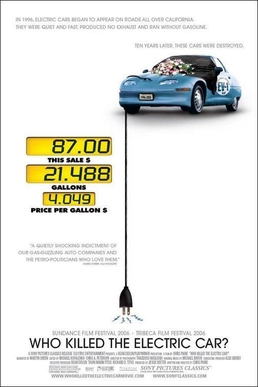Edmunds.com published a list of the top 10 most efficient 2008 sedans available. They ranked the cars based on EPA fuel economy numbers. And sweet moses would you guess that not one from an American manufacturer made the list! Even the Wall Street Journal, not known for its criticism to big business, has sharp words about American car manufacturers.
Now we see the results of the myopia that has afflicted Detroit auto executives. These are the people who staked their companies' futures on gas-guzzling, heavyweight behemoths.
Auto execs claim they were giving Americans the products they wanted. Really? For proof to the contrary, look at their U.S. market shares, which are slumping to historically low levels as Japanese auto makers gain ground.
In lieu of GM's stunning losses, I was reminded of the complete and utter arrogance they displayed when they crushed its fleet of EV-1 electric vehicles in the Arizona desert. The EV-1 was among the fastest, most efficient production cars ever built. It ran on electricity, produced no emissions and catapulted American technology to the forefront of the automotive industry.
The story of the EV-1 is documented in the amazing film Who Killed the Electric Car? It chronicles the life and mysterious death of the EV-1 and it examines the cultural and economic ripple effects caused by its conception and how they reverberated through the halls of government and big business.

A summary:
The film deals with the history of the electric car, its development and commercialization, mostly focusing on the General Motors EV1, which was made available for lease in Southern California, after the California Air Resources Board passed the ZEV mandate in 1990, as well as the implications of the events depicted for air pollution, environmentalism, Middle East politics, and global warming.
The film details the California Air Resources Board's reversal of the mandate after suits from automobile manufacturers, the oil industry, and the George W. Bush administration. It points out that Bush's chief influences, Dick Cheney, Condoleezza Rice, and Andrew Card, are all former executives and board members of oil and auto companies.
A large part of the film accounts for GM's efforts to demonstrate to California that there was no demand for their product, and then to take back every EV1 and dispose of them. A few were disabled and given to museums and universities, but almost all were found to have been crushed; GM never responded to the EV drivers' offer to pay the residual lease value ($1.9 million was offered for the remaining 78 cars in Burbank before they were crushed).
Embedded below, the film in its entirety:
If the above does not work, visit this LINK.
However its not all bad news. In the same WSJ piece - it would seem that some have climbed aboard the bus.
In a recent meeting with Ford executives, CEO Alan Mulally dared to challenge the Detroit gospel that you can't make money on small, fuel-efficient cars.
At last Ford appears to be making bold moves to design and sell vehicles that people want. In Paris earlier this summer I spotted an unfamiliar car so attractive that I went over to see what it was. It was a Ford. Presumably this is one of the six European models that, as part of the "Drive One" campaign, Ford will introduce in the U.S. Ford is also boosting production of its fuel-efficient "EcoBoost" and four-cylinder engines, speeding up hybrid introductions and converting three truck plants to small-car production.
Even GM seems to be facing reality. It said it's planning for oil prices in a $120-$150 range for the foreseeable future, boosting light vehicle production, and suspending production at four truck plants. It, too, is accelerating production of efficient four-cylinder engines, and announced a global Chevrolet small-car initiative.
While promising, what pulls my chain about the above is that rather than take responsibility for the planet and in the role these car companies play in emissions, the American car manufacturers are only taking these steps because of the price of gas. Let's hope their successful. However as they say, karma's a bitch.











3 comments:
Great diary. It amazes me how these manufacturers act like this buyer slump is completely unexpected. With the growth of many developing countries and the ever growing population of drivers, high gas prices were inevitable. Anyone could have looked at the trending price of gas 5 years ago and predicted that buyers would start wanting efficiency as prices got higher. Instead, American automakers went the completely opposite route and went bigger and less efficient every single year, even while the signs kept growing that we were going to have a serious gas crunch. Now, we're spending billions to try and pull these industries out of the holes that they dug. I'm not sure that I'm against trying to save these companies since they employ large amounts of people, but at the same time I fear that we're dumping money into an industry that will repeat their same mistakes. We'll see, I guess.
They build shitty, gas guzzling cars and blame their workers and their benefits for losing money.
The ruling class and business class has seriously failed this county. WAKE UP AMERICA!!!!
the american auto industry is the best example of inflexibility and arrogance. GM is facing tough times because of their lack of innovation and their own short-sighted greed. Forget the environment its all about money to them, you think they care about anything else?
Post a Comment